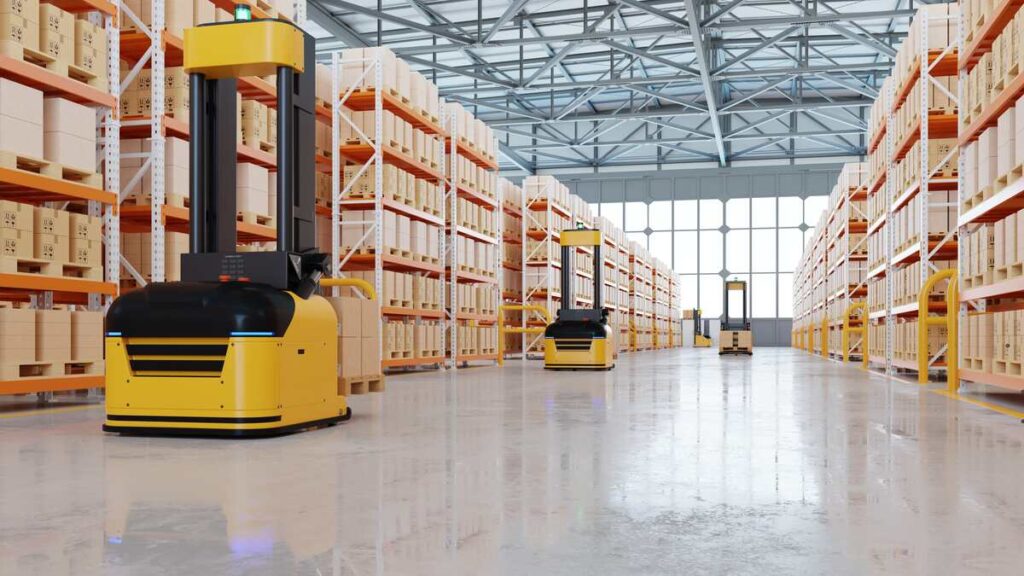In this article, we discuss AMR & AGV battery types and the technology behind them to help you make better-informed choices when making decisions on your automation needs.
Table of Contents:
AGVs (Automated Guided Vehicles) and AMRs (Autonomous Mobile Robots) continue to play an ever more prevalent part in many industries. Their role in streamlining material handling and boosting operational efficiency is so palpable that it’s clear these devices are here to stay. But behind their functionality lies a critical component: the battery. For many enterprises, its selection isn’t a technicality but rather a defining decision that will impact their bottom line. In this article, we discuss AMR & AGV battery types and the technology behind them to help you make better-informed choices when making decisions on your automation needs.
AGV and AMRs battery types
Given their reliability and low cost, the first AGVs have traditionally relied on lead-acid batteries, but the industry is now shifting toward lithium-based alternatives due to their efficiency and longevity benefits. Let’s take a closer look.
Lead-acid batteries for AGVs and AMRs
These have been the workhorses of the AGV landscape for a long time. Their low initial cost, reliability, and ability to deliver high surge currents made them a practical choice for early AGV adopters. However, they come with inherent limitations:
- Bulky and Heavy: Lead-acid batteries come with a lower overall energy density, which impacts maneuverability and runtime.
- High Maintenance: Charging is allowed only under canopy with hydrogen pull-out.
- Slow Charging: Extended charging times lead to operational downtime.
- Shorter Lifespans: Typically, lead-acid batteries last only up to 500 cycles. Thus, be prepared for relatively frequent replacements.
Lithium-Ion batteries
Lithium-based batteries are quickly replacing lead-acid in AGVs due to their superior performance. The key benefits include:
- Higher Energy Density: Provides longer operational times and reduces weight.
- Faster Charging: Enables ad-hoc charging, even during short breaks, to maximize uptime.
- Longer Lifespan: Can exceed 1,000 cycles, slashing replacement costs in half compared to lead-acid variants.
Minimal Maintenance: Li-ion batteries don’t require any additional actions for daily usage.
The future of battery innovation
With battery science and technology constantly evolving and many exciting new-fangled solutions on the horizon, future innovations in the field could also mean new AGV battery types and AMR battery types will hit the market with a ripple effect, essentially up-ending the present standards. What other possibilities should you keep an eye on for the future?
Solid-state batteries stand to revolutionize the industry from the ground up. Thanks to their nominally higher energy densities, they can vastly increase the operational capacities of AGVs, AMRs, and many other types of battery-powered devices.
Another potential game-changer are hydrogen fuel cells, which would create zero-emission automation solutions with plenty of density and efficiency to boot.
It’s important to note that while these technologies are still in development, they are still worth watching. Remaining abreast of new advancements and exciting innovations can inform your long-term planning and investment strategies into different AMR/AGV battery types you choose to ensure your business runs smoothly.
The takeaway
Selecting the optimal battery type for your AGVs and AMRs is a pivotal decision that directly influences the success of your automation initiatives. Generally speaking, lithium-ion solutions outperform other AMR and AGV battery types. That choice seems clear, especially if you opt for a trusted partner with long-established expertise in the industry, like EMBatterysystems. Contact us today to find out more about our tailored battery solutions that power your business!
Read also: How to Choose the Right Battery for Your AGV or AMR
What battery types have historically been used for AGVs and AMRs?
Why are lithium‑ion batteries increasingly preferred for AGVs and AMRs?
What future battery technologies are mentioned for AGV and AMR applications?
About the Author
EMBS
Leading manufacturer of advanced battery systems with a market presence of over 25 years. We specialise in rechargeable lithium-ion batteries, producing a wide range of systems with varying power and capacity.
